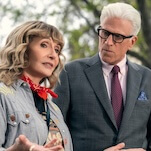Keep The River On Your Right

Taken from a 1969 book by Tobias Schneebaum, a painter-turned-writer and anthropologist who lived among indigenous peoples in Peru and New Guinea, the title of Keep The River On Your Right is accompanied by the caption "A Modern Cannibal Tale." Strictly speaking, the label is accurate: Schneebaum did partake of human flesh during his stay among the Amarakaire Indians in the Peruvian jungle, during the ritualized end to a harrowing episode in which he witnessed his friends slaughtering a neighboring tribe. Whether the subtitle was added for commercial or ironic purposes is unclear, but calling him a cannibal is roughly equivalent to calling a vegetarian "Ted Nugent" for eating a sliver of steak. Nevertheless, questions about the incident continue to haunt (and irritate) Schneebaum nearly half a century after the fact, dogging him on talk shows and at museum lectures, where he patiently counters with examples of the Amarakaires' cultural richness and humanity. Still an active, intellectually curious man at 78, he earns a modest wage giving slide presentations to passengers on a cruise liner through Indonesia, relaying his later adventures with another remote tribe, the Aswat of New Guinea. For this fascinating documentary, co-directors David and Laurie Shapiro coaxed the reluctant Schneebaum into returning to both Peru and New Guinea, in spite of his physical frailty and the emotional stress of unearthing repressed memories and nightmares. Keep The River On Your Right skillfully interweaves his extraordinary journey with a full account of his unorthodox immersion into these tribal cultures. As a young New York artist, Schneebaum was so inspired by photographs of the Machu Picchu ruins that he traveled to Peru on a Fulbright scholarship and wandered deep into the rainforest. After hearing no word from him for several months, the U.S. State Department declared him missing in 1955, but he eventually emerged in good health, naked and covered in body paint. A changed man spiritually and intellectually, he soon took an interest in Aswat carvings and again immersed himself, becoming an adopted son of the Aswat and engaging in sexual encounters with several of the tribesmen. Schneebaum's personal experiences cast more than a little doubt over his statements about the prevalence of homosexuality in tribal cultures, but the Shapiros don't go far enough in questioning his anthropology. They also take cheap shots at the so-called "civilized" world, cutting from his touching reunion in New Guinea to shots of cruise-ship hot-tubbers sipping "Aswat Coolers." But these are negligible flaws with a subject as endlessly compelling as Schneebaum, a master storyteller whose anecdotes are infused with warmth, candor, and a wry sense of humor. Clearly, his moment of cannibalism came not out of a taste for flesh, but an insatiable appetite for knowledge.







































